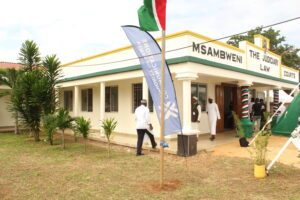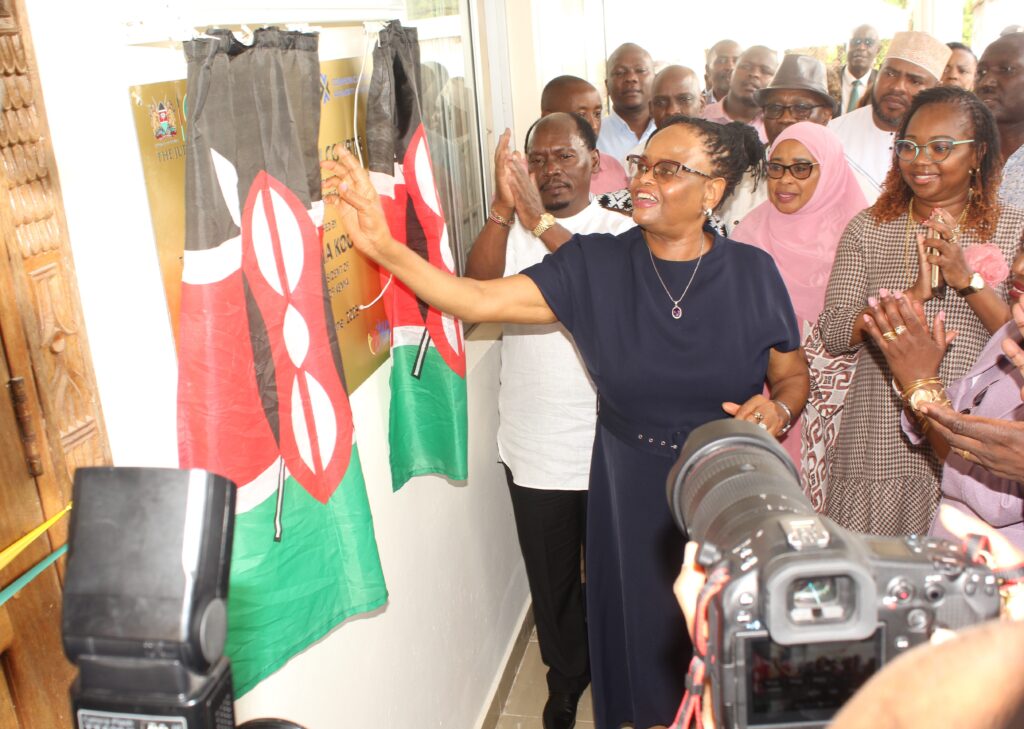BY SHABAN OMAR
Chief Lady Justice and President of the Supreme Court, Martha Koome, has issued a stern warning to magistrates and court users over involvement in corrupt practices.
Koome said that the judiciary is committed to uprooting all forms of misconduct that fuel corruption, in a bid to uphold integrity and reinforce the justice system.
“The Judiciary is a corruption-free zone. We are firmly implementing zero-tolerance policies to stamp out this vice from our courts,” she said.
The Chief Justice disclosed that there have been reported cases of fraudsters soliciting money from plaintiffs and defendants, falsely claiming to be representatives of magistrates or prosecutors.
She cautioned the public against falling prey to such scams, affirming that the Judiciary does not send intermediaries to act on its behalf.
“Our judicial system is independent, impartial, and fair. No one is authorized to collect money or act as a go-between for judicial officers,” she stated.

Koome reiterated that any individuals found engaging in such fraudulent activities whether inside or outside the court system will face the full force of the law.
Koome reaffirmed the Judiciary’s commitment to eliminating corruption and enhancing service delivery through the use of technology.
She spoke during the launch of the Local Area Network (LAN) Project at Msambweni Law Court in Kwale County.
Koome said the initiative is part of a broader government and Judiciary effort to digitize court operations, reduce human interaction, and curb bribery within the justice system.
“By embracing digital transformation, we are sealing loopholes that have allowed corruption to thrive. The LAN project will improve efficiency, transparency, and accountability in our courts,” she said.
The Chief Justice noted that the Judiciary is actively working to ensure all courts across the country are connected to digital infrastructure to support the automation of judicial processes.
Koome said the use of technology will not only accelerate case management but also ensure better access to justice for all citizens.
She said LAN connectivity offers distinct advantages over the older reliance on Wi-Fi.
The CJ said hard-wired networks provide higher speeds, greater reliability and enhanced security as well as supporting the high-definition video streams required for virtual court sessions, ensure faster e-filing and case tracking, and facilitate the smooth operation of administrative functions.
In addition to the LAN project, Koome revealed that the Judiciary has rolled out integrity committees in various courts.
The committees, composed of judicial officers and court staff, are tasked with promoting ethical conduct, monitoring court operations, and providing oversight to prevent malpractice.
She urged the magistrates to ensure courts remain places where justice is served without fear, favour, or corruption.
“Courts are supposed to follow the law since they are the custodians,” she added.
Koome urged court users to remain vigilant and report any cases of misconduct or fraudulent behavior.
She stressed that the Judiciary does not tolerate any form of corruption, whether by its officers or outsiders posing as intermediaries.
The Chief Justice further appealed to stakeholders, including the Law Society of Kenya, civil society, local leaders, government and the public, to support the Judiciary in its reform agenda and work collectively to uphold the rule of law.
She also encouraged the integration of the Judiciary into national ICT projects across government.
She said that Justice is a public good just like health, and education and deserves equal inclusion in discussions and programmes that shape the future of digital Kenya.

ICT Cabinet Secretary William Kabogo said the rollout of the LAN project is part of President William Ruto’s transformative Digital Superhighway agenda aimed at creating a digitally empowered society.
Kabogo said the government is committed to enhancing internet connectivity in courts to ensure the effective and timely delivery of justice.
“Digitizing our courts is key to modernizing judicial services. It will improve efficiency, reduce delays, and promote transparency in the administration of justice,” he said.
Kabogo noted that the initiative is not just about infrastructure but about making justice more accessible and inclusive for all Kenyans.
He emphasized that internet connectivity will ease court processes such as e-filing, virtual hearings, and real-time access to legal information.
Kabogo said President Ruto’s administration envisions a future where every Kenyan, regardless of location, can benefit from fast, reliable, and secure digital services adding the Judiciary is a critical partner in that journey.
The Cabinet Secretary assured that the Ministry of ICT will continue to collaborate with the Judiciary and other stakeholders to ensure more courts are connected and digital systems are fully integrated.
He said no Kenyan should be left behind in this digital transformation and that the government is determined to bridge the digital divide, especially in the justice sector.
Kabogo further praised the Judiciary’s efforts to embrace digital solutions.


